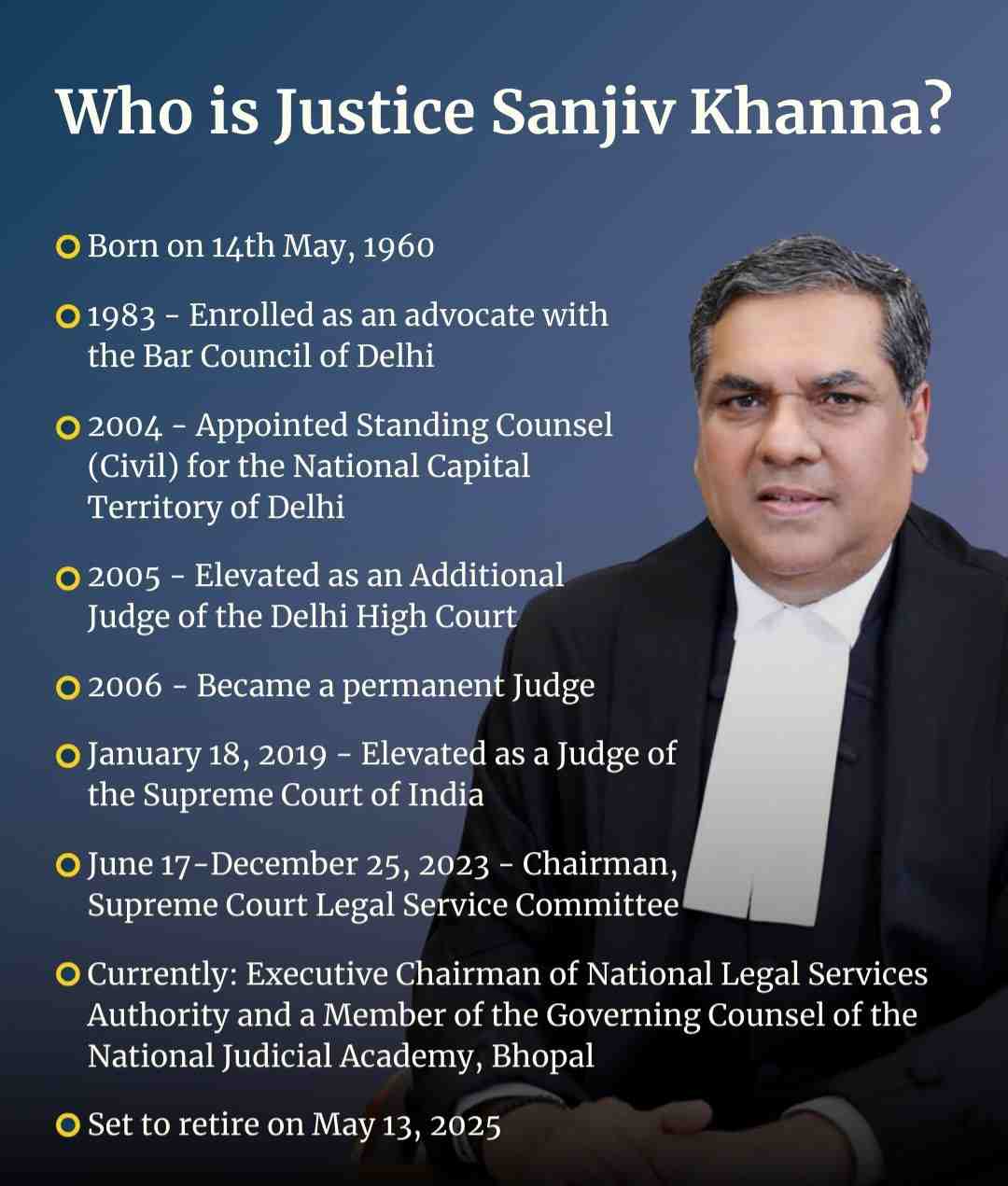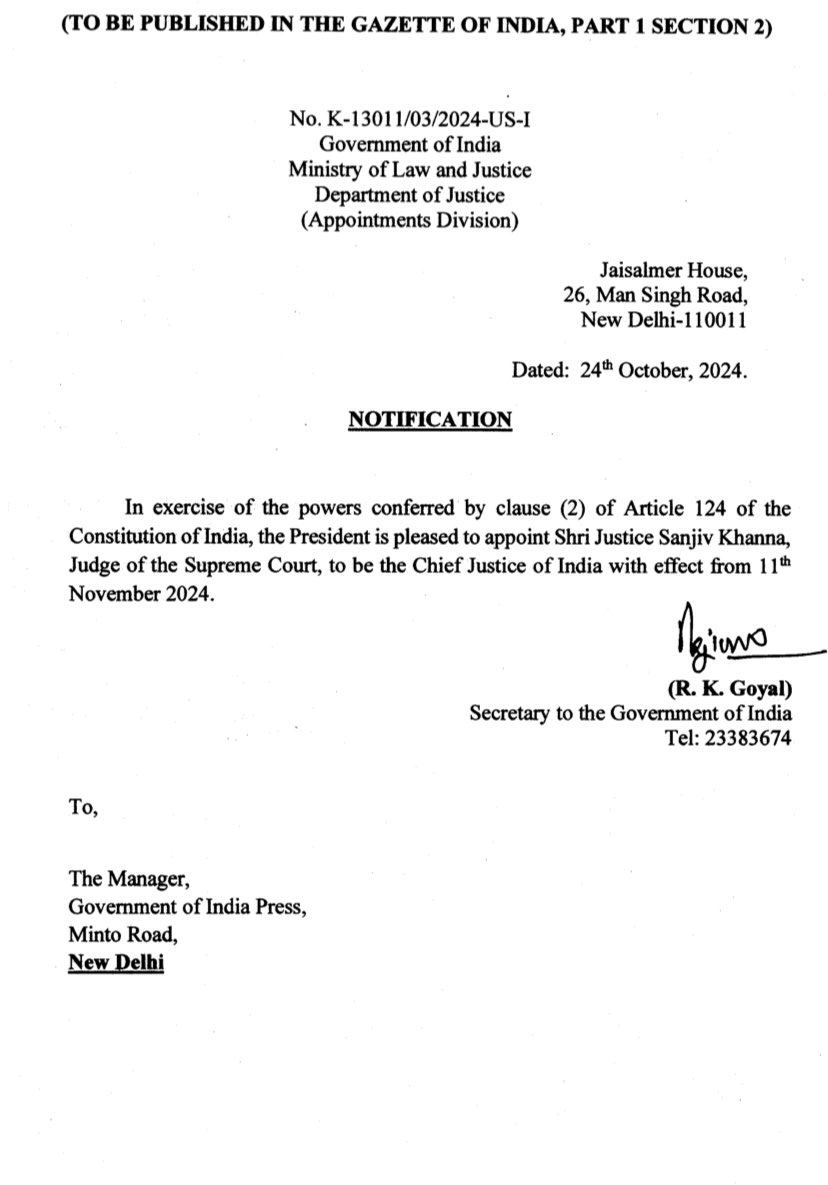Justice Sanjiv Khanna, born on May 14, 1960, is the Supreme Court of India judge appointed as the new CJI, succeeding the current CJI, D.Y. Chandrachud.
He will take his oath of office on November 11, one day after incumbent Justice D.Y. Chandrachud retires at the age of 65.
He has been a member of the Supreme Court of India since his appointment on January 18, 2019.
Currently, he has been in office for nearly 5 years and 9 months. Before his appointment to the Supreme Court, he served as a judge in the Delhi High Court from June 24, 2005.
Who is Justice Sanjiv Khanna?
Justice Sanjiv Khanna, born on May 14, 1960, is a prominent judge of the Supreme Court of India. He has a distinguished legal background, having enrolled as an advocate with the Bar Council of Delhi in 1983.
Initially, he practiced in the District Courts at Tis Hazari and later shifted to the Delhi High Court, specialising in various fields including constitutional law, taxation, arbitration, and environmental law.
He was appointed as an additional judge of the Delhi High Court on June 24, 2005, and became a permanent judge on February 20, 2006.
Justice Khanna was elevated to the Supreme Court on January 18, 2019, where he has since authored numerous significant judgements and served on various benches.

Source: X
In addition to his judicial responsibilities, he holds the position of Executive Chairman of the National Legal Services Authority and has been involved with the Delhi Judicial Academy and other legal institutions.
Justice Khanna is also noted for his familial connections to the judiciary; his father, Justice Dev Raj Khanna, served on the Delhi High Court, and his uncle, Justice Hans Raj Khanna, was a notable Supreme Court judge known for his dissenting opinion in the landmark Habeas Corpus case.
Justice Khanna is expected to retire on May 13, 2025, and is in line to become the 51st Chief Justice of India following the retirement of current Chief Justice D.Y. Chandrachud in November 2024.
What are Justice Sanjiv Khanna's Notable Judgements in the Supreme Court?
Justice Sanjiv Khanna has authored several notable judgements in the Supreme Court of India since his appointment in January 2019. Here are some significant cases:
- VVPAT Verification: In Association for Democratic Reforms v Election Commission of India (2024), Justice Khanna led a bench that rejected a plea for 100% verification of Voter Verified Paper Audit Trail (VVPAT) slips, affirming the Election Commission's safeguards for free and fair elections.
- Electoral Bond Scheme: He was part of a five-judge bench that declared the electoral bond scheme unconstitutional, emphasising that the right to privacy of donors does not justify the lack of transparency in political funding.
- Abrogation of Article 370: In 2023, Justice Khanna authored a concurring opinion in a landmark ruling that upheld the abrogation of Article 370, stating it was consistent with India's federal structure.
- Divorce Under Article 142: In Shilpa Sailesh v Varun Sreenivasan, he ruled that the Supreme Court has the power to grant divorce directly under Article 142, citing "irretrievable breakdown of marriage" as grounds for complete justice.
- Interim Bail for Arvind Kejriwal: Justice Khanna granted interim bail to former Delhi Chief Minister Arvind Kejriwal in a case related to the Delhi Excise Policy, highlighting the importance of the right to life and liberty when prolonged detention occurs without trial.
- RTI Judgement: In CPIO, Supreme Court v Subhash Chandra Agarwal (2019), he addressed whether the Office of the Chief Justice should be subject to RTI requests, concluding that judicial independence does not inherently oppose the right to information.
Areas of Law in which Justice Sanjiv Khanna specialises
Justice Sanjiv Khanna specialises in several key areas of law, reflecting his extensive experience both as an advocate and a judge. His notable areas of expertise include:
- Constitutional Law: He has been involved in significant constitutional matters, including cases related to the abrogation of Article 370 and electoral integrity.
- Arbitration and Commercial Law: Justice Khanna has handled numerous arbitration cases and commercial disputes, contributing to the development of commercial jurisprudence in India.
- Taxation Law: He served as a Senior Standing Counsel for the Income Tax Department, dealing with direct tax appeals and income tax prosecutions.
- Company Law: His practice included matters related to company law before the Company Law Board.
- Environmental and Pollution Laws: Justice Khanna has addressed issues related to environmental regulations and pollution control.
- Medical Negligence: He has also dealt with cases concerning medical negligence before consumer forums.
- Criminal Law: He represented the Government of Delhi as an Additional Public Prosecutor, engaging in various criminal law matters during his tenure at the Delhi High Court.
Justice Sanjiv Khanna: To be Appointed as the 51st CJI
Justice Sanjiv Khanna has been officially appointed as the 51st Chief Justice of India (CJI), with his oath taking place on November 11, 2024.

Source: X
This appointment follows the retirement of the current CJI, D.Y. Chandrachud, who will step down on November 10, 2024. Justice Khanna's tenure as CJI will last until his retirement on May 13, 2025.
Conclusion
In addition to his judicial responsibilities, Justice Khanna has held leadership positions in various legal bodies, such as the Supreme Court Legal Services Committee and the National Legal Services Authority (NALSA), advocating for reforms to enhance access to justice.
Justice Khanna's appointment as CJI marks a significant transition within the Indian judiciary, and his upcoming tenure is anticipated to address pressing issues related to judicial reforms and maintaining judicial independence.
#CurrentUpdate
— Upsc Civil Services Exam (@UpscforAll) October 24, 2024
President Droupadi Murmu has appointed Supreme Court Judge Sanjiv Khanna as the new Chief Justice of India. pic.twitter.com/i7Atnx32hc
Also Read: List of all Chief Justices of India (1950-2024)
Comments
All Comments (0)
Join the conversation